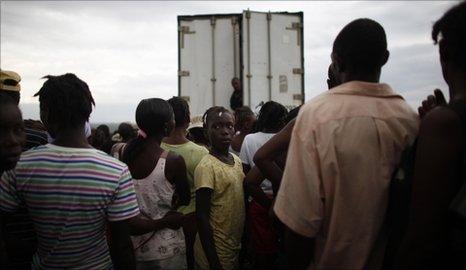Quake-stricken Haiti bears scars six months on
- Published

More than a million Haitians live in relief camps, six months after the quake
If there is any hope for Haiti, you surely find it in the broad smile of six-year-old Telia Jacques.
She smiles despite her thin left leg that will not fully straighten, and despite the prominent vivid scar that runs down her forehead from the hairline to just above the right eyebrow.
And she smiles even though she - like her country - will forever be affected by the earthquake that destroyed so many lives.
Six months ago, Telia was lying on the floor of L'Hopital de la Paix, in the Haitian capital of Port-au-Prince, wrapped in dirty, blood-stained sheets, her legs shattered, her head smashed open.
She had been crushed when her home fell on her.
Above her stood a desperate father, Astrel Jacques, pleading for the world to help.
The hospital had no medicine, and barely a doctor.
"Ca va?" he asked his daughter. "Oui," she replied, but she was not OK.
The next morning he realised he had to find a doctor. So he managed to get Telia into someone's car, and drove until he came across some aid workers. They helped him and his daughter across the border to the Dominican Republic.
There she spent a month and a half in different hospitals, and her life was saved.
Tarpaulin city
Another daughter and Mr Jacques' mother-in-law both died in the earthquake.
"Six months after not one day passes when I don't think about the earthquake," he says. "When I don't think about how our life was together. We lost everything. Everything has gone."
On the surface there is little change here.
The building material of necessity - blue plastic tarpaulin - covers much of Port-au-Prince.
Telia Jacques spent six weeks in different hospitals
The slums that seethe under those tarpaulins were meant to be temporary. Now they house more than a million people and have an air of permanence.
So Fabula Gilme can count herself lucky - and that here is a relative term - in that she at least has a corrugated tin roof above her head.
Most of the time it protects her and her son Mackenzie.
"There are holes in the roof. Sometimes when it rains, it leaks on the baby - I don't know what to do," she says.
Mackenzie was born a week after the earthquake. He barely made it into this world. Fabula was almost too weak to give birth.
Outside her home there is a mound of rubble. The view from here has barely changed in the last six months.
"It's the same it was. Everyone is using corrugated roofs, and tents and tarpaulins. Houses haven't been rebuilt. There are still people sleeping in damaged homes. Some sleep in tents."
That pretty much sums up this capital city. Rubble still appears to lie everywhere. Small groups of workers - paid mostly by international aid - clear patches by hand. There is little sign of the much-needed heavy lifting equipment.
'Lost everything'
It partly explains why it takes so long to get up to Jean-Michel Fleurimond's home. Or rather what remains of it.
The paths in his village are blocked by rubble.
Jean-Michel has no family anymore. His two brothers are still buried under the rubble of their home.
Tarpaulin-covered slums litter the Haitian capital
"I lost my brothers and everything I own," he says.
Now he lives in a small tin shack, with bare earth for a floor. When it rains, the water runs right through the space, eroding the ground.
He pulls out two sheets of wood, and a thin white curtain. This is his "bed".
"Before, my life was good. I am an artist. I used to make artwork to pay for school. My mother used to help me pay, too."
"Since the earthquake, I've been on my own. I can't live how I want to because I don't have a job. I can't feed myself how I like to. It's very difficult."
He gets by thanks to the Red Cross. It pays him and others $5 (拢3.30) a day to improve the camp. He helped to build the steps that lead through the shelters, for instance.
But they are squatters here, and they fear soon the landowner may move them on.
'Frozen in time'
Help has also come for Iselene Celne. Six months ago she was trapped under the rubble - she lost an arm, and both her hands.
Now her children help her run a tiny stall she's managed to start up with money from a small British charity, Tearfund.
"Without them, I'd be nothing," she says.
She shrugs with the stump of her arm.
"I'd have no money. I'd feel humiliated. Without the business what could I do?"
Iselene Celne lost an arm and both her hands
On the surface, there has been some progress here. There's clean water in the camps to drink and to wash with. Educational projects are starting up. The Haitian police are starting to patrol the city and the camps.
But few, if any, of the Haitians here feel that things are actually improving. It is as if their lives have been frozen in time.
A day after the earthquake, Astrel Jacques stood beside his dying daughter in the hospital and said: "We are fighting."
And now, half a year on, with Telia smiling next to him, he repeats those exact same words.
He and the rest of the survivors know that they will have to keep fighting, if life is to get any better.